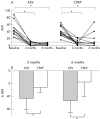Compliance with and effectiveness of adaptive servoventilation versus continuous positive airway pressure in the treatment of Cheyne-Stokes respiration in heart failure over a six month period
- PMID: 15964943
- PMCID: PMC1860836
- DOI: 10.1136/hrt.2005.060038
Compliance with and effectiveness of adaptive servoventilation versus continuous positive airway pressure in the treatment of Cheyne-Stokes respiration in heart failure over a six month period
Abstract
Objective: To compare compliance with and effectiveness of adaptive servoventilation (ASV) versus continuous positive airway pressure (CPAP) in patients with the central sleep apnoea syndrome (CSA) with Cheyne-Stokes respiration (CSR) and with congestive heart failure in terms of the apnoea-hypopnoea index (AHI), quality of life, and left ventricular ejection fraction (LVEF) over six months.
Methods: 25 patients (age 28-80 years, New York Heart Association (NYHA) class II-IV) with stable congestive heart failure and CSA-CSR were randomly assigned to either CPAP or ASV. At inclusion, both groups were comparable for NYHA class, LVEF, medical treatment, body mass index, and CSA-CSR.
Results: Both ASV and CPAP decreased the AHI but, noticeably, only ASV completely corrected CSA-CSR, with AHI below 10/h. At three months, compliance was comparable between ASV and CPAP; however, at six months compliance with CPAP was significantly less than with ASV. At six months, the improvement in quality of life was higher with ASV and only ASV induced a significant increase in LVEF.
Conclusion: These results suggest that patients with CSA-CSR may receive greater benefit from treatment with ASV than with CPAP.
Conflict of interest statement
Competing interests: the study was supported by non‐profit organisation funds (ADEP Assistance) and a non‐commercial donation made by ResMed France to support research in the Créteil Sleep Laboratory in 2001. CP and M‐P d'O were reimbursed by ResMed for travel expenses to attend the American Thoracic Society Annual Conference 2004; SR is employed by ADEP Assistance, which is a non‐profit organisation for home care. Other authors have no declared conflict of interest.
References
-
- Bradley T D, Floras J S. Sleep apnea and heart failure. Part II. Central sleep apnea. Circulation 20031071822–1826. - PubMed
-
- Hanly P, Zuberi‐Khokhar N. Increased mortality associated with Cheyne‐Stokes respiration in patients with congestive heart failure. Am J Respir Crit Care Med 1996153272–276. - PubMed
Publication types
MeSH terms
LinkOut - more resources
Full Text Sources
Medical




